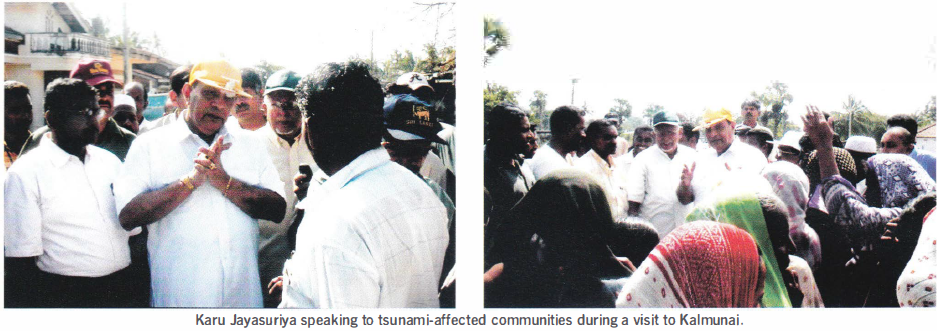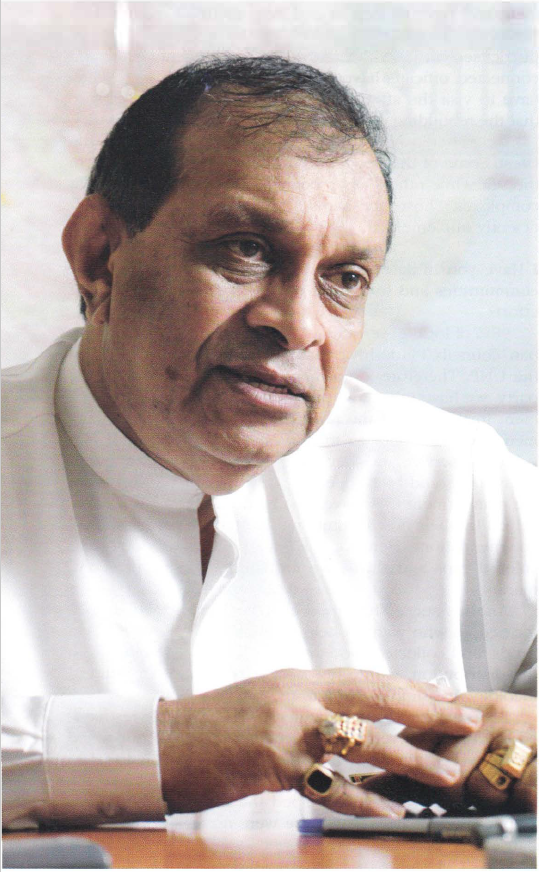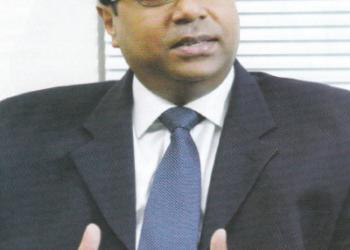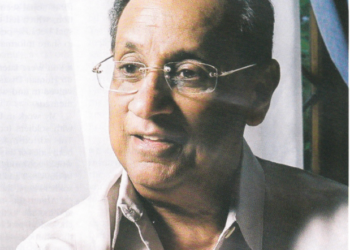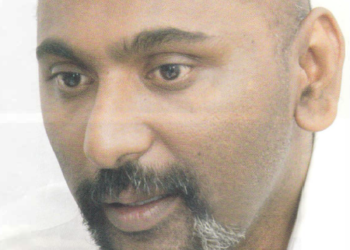The post-tsunami rebuilding of the affected areas in Sri Lanka has begun. Although different plans for the reconstruction and rehabilitation process have been put forward, one underlying reality remains constant all factions should work together for the greater good of the country.
In this interview with Business Today, the Deputy Leader of the United National Party (UNP) Karu Jayasuriya discusses the impact of the natural disaster and plans of rebuilding with input from all concerned, the need for a transparent approach in disbursing and handling aid, and fundamentally, the hope for a fresh and disciplined political culture.
The Deputy Leader of the Opposition is optimistic that life should return to normalcy very soon provided all Sri Lankans work with unity and a vision.
By Rashmini Mather
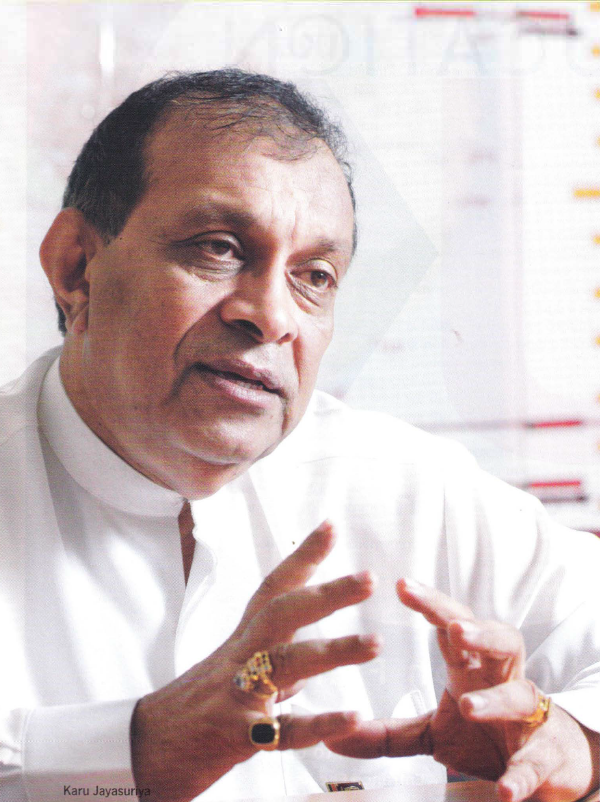
Which tsunami-affected areas, have you personally visited? I. a well as the leader of the opposition, our parliamentarian and provincial counselors. have been touring throughout the i land. There is vast devastation and sadness. A disaster of chi nature has not occurred in the history of this country except for the time when King Kelanitissa ruled and there was a tidal wave. But there was no recorded evidence of the number of people killed and the population was obviously very much less at that time. A complete rebuilding program, a master plan with a set national policy, is required. This must be done urgently. Time is running out. Of immediate importance is obtaining accurate and up-to-date statistics about the numbers of deaths, houses destroyed or damaged, people displaced, people missing boats lost, etc. This kind of information should be provided by the government agents. We know that the President and the government are making every effort to obtain this information but this is not a simple task due to the breakdown of the administrative system and the nature of the disaster. For example, December 26 was the market (pola) day in Hambantota and we’re trying to ascertain the details of the thousands of people who were washed away. The difficulty is because many people were not residents of the area but producers who had come to market their goods or visitors from other villages.
A structured reconstruction planning program cannot begin until and unless the relevant data is collected. Otherwise we are speaking like blind men. Thereafter there ought to be a national policy set and committed task forces established with the right people and specialists co draw up and implement the national plan. The plan has co be discussed by all factions involved and a consolidated effort is crucial. We, as a responsible opposition, have assured the President, Prime Minister and the government that we are committed to help. We will stand by the people of this country and we will fulfill our duty.
In your opinion, what is the economic impact of this natural disaster?
The sectors worst affected by the tsunamis were the fisheries and tourism industries. Of the registered boats, we have learned that approximately 25,000 were destroyed. However, we know that a large number of fishermen do not register their boats. In addition, there are people directly linked to the fishermen such as the fish market vendors, mobile fish sellers and boat laborers who were affected. Everyone must be compensated.
We believe that with a consolidated effort, we should be able to restore normalcy in the fisheries industry within three months and we will see the fishermen back in the sea. They should be given their requirements of a house, boats and financial backing so that they can return to their livelihood. After the tsunamis, people stopped eating fish and thus there has been a tremendous drop in fish prices. We must now ensure chat the fish eating habit of the people is restored using appropriate marketing and education programs.
The tourism sector also suffered heavily. Here again, we believe that such a definite plan, the tourism industry can return to normalcy for the 2006 winter season. Numerous foreign dignitary have once visited Sri Lanka and said they will encourage their countrymen to travel here. After all, tourists can visit other interesting locations that have been unaffected by the tsunami such as the hill country, ruined cities, cultural site . wildlife parks. etc. We should strengthen the amenities in the ocher areas immediately by offering long-term loans, payment deferments or concessions as well as implement a plan co promote them so that they can attract tourists. In addition to tourism and fisheries there were other industries affected like agriculture and factories as well as small traders such as shop owners. We feel that the government will have to step in and help them all re tore their businesses in order to revive the national economy. The district secretaries, Grama Sevakas, government agent and connected officials have a tremendous role to play. They have to visit the affected villages, collect data and ensure that the rebuilding of houses is clone as a matter of priority. Housing should be constructed within six months at the latest. Some of the people do not wish to move away from the sea while others are prepared to move into apartment complexes. Those facts should be ascertained and plans efficiently implemented.
Have you initiated any programs to assist the affected communities and how have you participated in the relief effort?
98% of local government institutions (municipalities/urban councils/Pradeshiya Sabas) are under the control of the UNP. Therefore, on a directive from the leader of the party, we have initiated a program where the local government institutions of the non-affected areas are mobilizing men and machinery to rehabilitate affected areas. It is a voluntary service and they have cleared debris, cleaned up many areas and built toilets. I was pleasantly surprised at the commitment they have displayed and they are well received by their host institutions. We have received several commendations. Here we don’t talk politics, we don’t wear colored caps and shirts; we are simply serving the community.
Another successful program is the ‘Eksath Sahana Seva’ for people who want to help through the UNP. We raised funds, and collected food and useful items. Here again in the distribution, we do not look at color, race or political ideology. We simply give it to the needy. I was amazed by the manner in which people responded even by the evening of December 26; sending cooked food parcels, dry rations, clothes and cooking utensils to the north, south, east and west. The Buddhists helped the Christians, the Christians helped the Muslims, the Tamils helped the Sinhalese, etc; there were no racial or religious barriers. This disaster can be harnessed to build our little island, provided there is national unity and national consensus. We have observed other countries that have been reduced to ashes rising again as world powers. We should follow a similar path. Yet first and foremost, this nation needs discipline. Discipline coupled with consensus and commitment amongst all can make the difference. I must emphasize that from top to bottom and vice versa, discipline is essential especially at a time of national calamity.
“This disaster can be harnessed to build our little island, provided there is national unity and national consensus. We have observed other countries that have been reduced to ashes rising again as world powers. We should attempt to follow a similar path. Yet first and foremost, this nation needs discipline. Discipline coupled with consensus and commitment amongst all can make the difference.”
Speaking of commitment, the international community has reached out to Sri Lanka in a most generous manner during this time of crisis. What is your reaction to this?
The fact that all countries are assisting Sri Lanka is an indication that we are accepted and loved by all concerned. We have an enormous amount of funds coming in so it is up to us, the government and all the political parties of this country, to make use of it appropriately. We have observed other countries where a huge amount of funds were promised but unfortunately it was not properly utilized and eventually the pledged fund were nor given. A case in point is Afghanistan “·here billion of dollars were pledged initially but very little eventually came in. We have to display that we are a nation that ensure transparency in all dealings and that we are capable of u ing that money wisely for the benefit of the people. If that happens. this country has great potential and so more aid would flow. We have also seen various concessions extended by the European community and other countries for Sri Lankan products. That will be a boom for some of our export industries. If the US too extends similar concessions. our industries will get a tremendous boost.
Despite the tragedy, most people including the international community see this as an opportunity to put to rest ethnic and political differences as well as to provide a better quality of life to the poor. You already touched on the subject but can you elaborate?
It is indicated that about 40% of the population lives below the poverty line in this country. When the international prices of petroleum went up, and when our cost of living went up, the poverty line was further extended. Historically, we have seen poverty creating social unrest and revolutions. This country itself was subject to youth insurrections in 1971 and 1989. The youth unrest was because of unemployment. Similarly if people don’t receive sufficient food to eat or a roof or concessions to live, they will feel impatient and insecure. It is up to the government, political parties and all those concerned to ensure that the distribution of wealth is not uneven. The gap should not be too wide; if the gap widens, social unrest could erupt. As a responsible political party, we stand for equitable political distribution, creation of wealth with policies that are realistic and investor-friendly, and those that will bring happiness to the people of this country.
In terms of rebuilding Sri Lanka, what do you consider as the key areas to initially develop?
When there is a disaster of such magnitude, the initial step should be to return life to normalcy. Therefore infrastructure such as the roads, railways, hospitals, schools, electricity and water supply, etc should be restored. It is a matter of national priority to do so and we have been discussing these aspects with the President and the disaster management team. Available data indicates that close upon 90.000 houses have been damaged and 24,000 house partially damaged. Therefore it is a priority to provide suitable housing for them. It is time for the people with partially damaged houses to be allowed to reconstruct and return home early with some assistance. They should be told specifically if they are to build their houses on the original site or whether they be offered an alternative location. An observation I have made during my recent travels is that the affected people are becoming depressed and irritable. This is a natural human reaction when considering their plight: no home. no job and their dear ones lost. There should be a lot of understanding on the part of neighbors and the entire nation for those affected people.
That is why we as a political party are not staying in Colombo but are traveling to the affected areas; talking and living with the people in order to share their grief and lend a helping hand.
The country’s private sector has come forward to assist in numerous ways. How best do you think the private sector can be mobilized in the reconstruction effort?
We are very glad that the private sector has come forward and also to see some of the giants in the private sector involved in the nation building program. We have a wealth of talent in this country. The private sector is well organized and we have many eminent people in the fields of architecture and engineering. We have suggested to the President that professional associations like the Institute of Architects, Institute of Engineers, surveyors, Organisation of Professionals Association COPA), and other related specialists be consulted. I myself work very closely with them. I have seen their commitment in times of disaster. Furthermore, the private sector has a social responsibility because it is only if the country is safe and free from social unrest that the private sector can exist and thrive. The private sector should look at this disaster as an opportunity to help their fellow countrymen. They can continue to be involved in the nation building exercise by constructing houses, roads, bridges, etc at reasonable cost.
Do you have any suggestions on how to ensure a transparent and non-discriminatory approach when distributing funds and establishing reconstruction projects to affected areas?
With regard to disbursement of foreign funds, we believe that all the money should be dealt with transparently and subject to parliamentary control. We’re told that some of the funds that are channeled through the UN are subject to audit by a leading audit company. So there is no doubt that the government is aware of the need for transparency and the donor countries too will insist on it. On the management side. all parties should be involved in the decision-making process. In the award of contracts particularly, one has to be extremely careful so that some sort of set procedure is followed. If this all-party involvement takes place and there is dialogue and discussion, I’m certain many of these challenges can be overcome.
Where would you like to see the country in ten years time, particularly if we can undertake this rebuilding process in a focused manner?
I was born to pre-independent Sri Lanka and I participated in the country’s first Independence Day celebrations. I hail from the same area as the late D S Senanayake. We were full of hope at that time. I remember a time when we had a model government administration, an efficient police and judiciary, clean hospitals, the Ceylon Railway was considered the best run railway in the world, and you observed discipline, law and order down the line. That is all gone now. Instead of looking ten years forward, we should look 20 years back because we could have been a Singapore or Hong Kong today if this country had unity, peace and national consensus. Sadly this country became a politicized nation. From birth to death, politics became supreme to everything else. Eventually politics became a power struggle; to get power people went down to low levels. The country needs fresh thinking, a fresh political culture. Politicians must realize that it is only ideologies that differentiate us. For the sake of obtaining power, you don’t require guns, bombs and destruction. With the ballot, you can allow the people to make decisions. But in this country, deaths occur even for cooperative elections. We should be ashamed of ourselves. Fifty-seven years after independence, why have we gone back and not forward? This country first needs discipline. With a fresh political thinking, a disciplined approach, a balanced judiciary, and a new political culture, in ten years time, Sri Lanka can certainly be a better place to live and the generation unborn will have a better quality of life.
How can this fresh political thinking you speak of realistically be achieved?
It is up to the political leaders to make that change and it is up to the people of the country to send the right people to parliament. Civil society must stand up against what is wrong. Unfortunately in Sri Lanka, civil society is not so well organized as in other countries. Elsewhere, if the politicians misbehave, they come out to the streets, but here people take things for granted. Provided all politicians can now think of a ‘nation reborn’, let us unite for the sake of the country.
